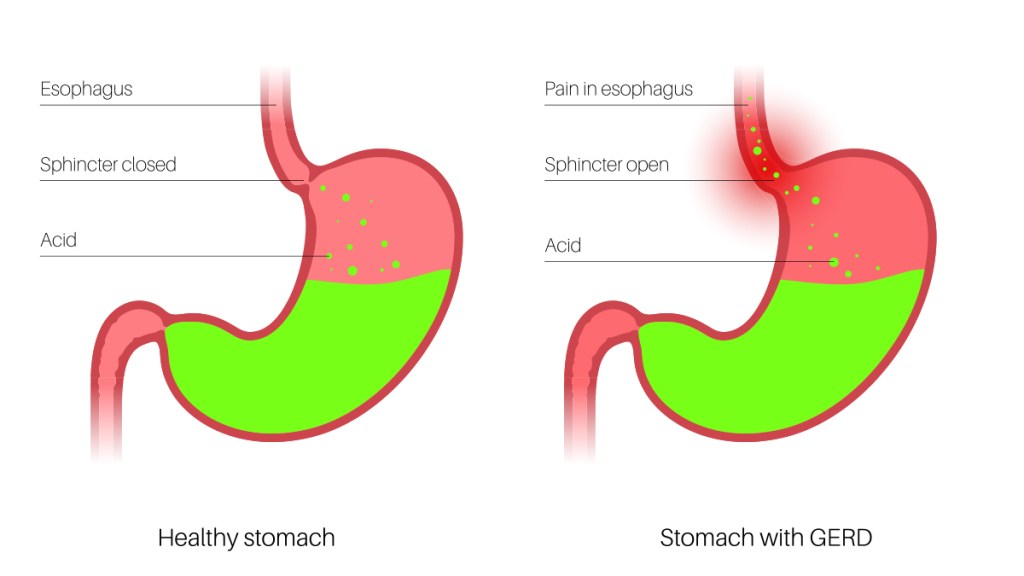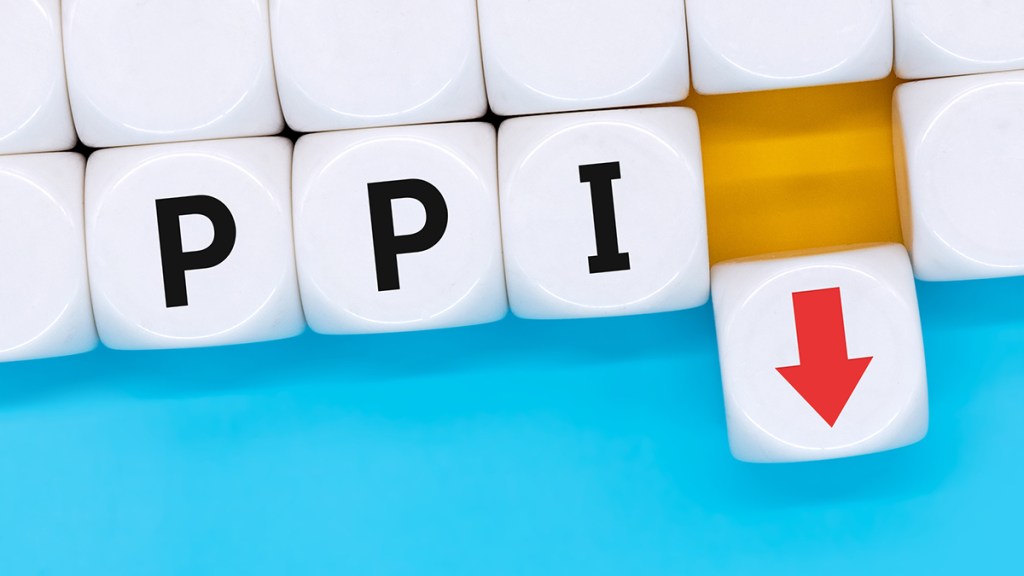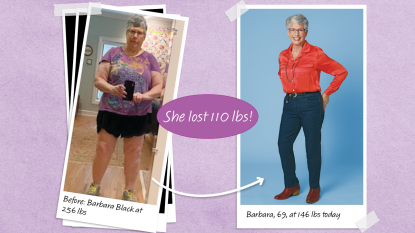MD: These Common Prescription Medications May Make Heartburn Worse — 4 Easy Ways to Outsmart the Problem
Plus, the common mistake that raises your risk of heartburn — no matter what meds you take

By now, you likely know that eating rich, fatty, spicy and/or acidic foods can spur the stomach to overproduce stomach acid, which can splash up into the esophagus, leading to the burning pain of heartburn, or acid reflux. Acid reflux feels like a burning sensation in your chest that can range from mild to severe. Other symptoms can include nausea, a bitter taste in your mouth or bloating.
Typically, a heartburn flare up lasts anywhere from a few minutes to a few hours. And heartburn is incredibly common: More than 60 million Americans experience heartburn at least once a month. All of this is well-known. What’s surprising? There’s another sneaky cause of heartburn: certain over-the-counter (OTC) or prescription medications. The list of drugs that make acid reflux worse is longer than you might think. We tapped top doctors to find out why certain drugs aggravate acid reflux and provide tips for reducing symptoms. Read on for the details.
Understanding why certain meds make acid reflux worse
There are several ways meds make acid reflux worse, explains Peyton Berookim, MD, FACG, a double-board-certified gastroenterologist and internal medicine physician at the Gastroenterology Institute of Southern California in Beverly Hills. Read on for the four most common, then keep scrolling for tips to outsmart the problem.
1. Some meds can relax the lower esophageal sphincter

The lower esophageal sphincter (LES) is a small ring of muscle that connects the esophagus to the stomach. It opens when you eat and closes during digestion to prevent stomach acid from flowing back into your esophagus.
Drugs that can cause the LES to relax include:
- Calcium channel blockers and beta-blockers for high blood pressure and heart disease
- Statins used to lower cholesterol
- Bronchodilators for asthma and bronchitis, such as theophylline
- Certain nutritional supplements, like peppermint oil
Foods like chocolate, alcohol and fatty foods affect LES function, too, so if you take your medication with a meal containing these ingredients, you’re more likely to experience heartburn afterward.
2. Some meds contain ingredients that damage the esophagus
Certain drug classes contain caustic ingredients that damage the soft, delicate lining of the esophagus. More specifically, they cause “inflammation or an erosion of the esophageal lining, resulting in heartburn,” explains Dr. Berookim. “In severe cases, these medications can even cause ulcers in the esophagus, a condition known as pill-induced or erosive esophagitis [inflammation of the esophagus].” Researchers have identified more than 30 medicines that increase the risk of esophagitis, including antibiotics like tetracycline and clindamycin, over-the-counter pain relievers and osteoporosis medications. The condition damages the esophageal lining, and if you have gastrointestinal reflux disease (GERD), it exacerbates your symptoms, making them even worse.
What’s more, nutritional supplements like iron and vitamin C may be more likely to get stuck in the esphogus and cause damage.
3. Some medications cause acid rebound
Acid rebound occurs after regularly taking heartburn medications, like proton pump inhibitors (PPIs) like Prevacid or histamine-2 receptor agonists (h2 blockers) like Tagamet. These drugs suppress the amount of acid that your stomach produces and increase the production of a hormone called gastrin.

Unfortunately, even after you stop taking these medications, your gastrin levels may remain elevated. This causes your stomach to produce even more acid, resulting in acid rebound, or heartburn that can be even worse than your initial symptoms. And a review of studies found that taking PPIs daily for more than four weeks triggered acid rebound that lasted up to several weeks. For that reason, doctors recommend gradually tapering off use of these kinds of heartburn drugs — a strategy that can reduce the risk of acid rebound. (Certain medications can also make it hard to sleep at night even when you’re tired. Click through for the easy fixes.)
Related: These Home Remedies Help Stop Burning Stomach Pain in Its Tracks, Doctors Say
The most common pill-taking mistake
One often-overlooked cause of medication-induced heartburn (no matter what medication or supplement you take) is dry swallowing, or taking pills without liquid. “I see this a lot with my patients,” says Dr. Berookim. “Someone is about to go to bed and they realize they forgot to take their antibiotic or another medication. They pop a pill, but there’s no water around, so they swallow it dry or take one sip of water and then lie down. Now, the pill just sits in their esophagus overnight and can end up causing a lot of damage, like esophageal irritation and worse heartburn.” The simple fix? Always take medication with liquid.
4 easy ways to prevent medication-induced acid reflux
Dr. Berookim says there are several strategies you can use to reduce heartburn and get the most from your medication:
1. Take your medication with alkaline water
“Whenever I have a patient who experiences frequent acid reflux, I have them drink alkaline water,” says Dr. Berookim. “Regular tap water has a pH of about 7.4, but alkaline water has a pH of 9.4 to 9.5. Since the stomach is very acidic, alkaline water helps neutralize that acid.”
Therefore, if a certain medication triggers your symptoms, alkaline water can ensure less acid comes back up. “And, if acid does enter your esophagus, it’s diluted,” adds Dr. Berookim.
Research backs this up. One study published in the Annals of Otology, Rhinology & Laryngology found that alkaline water neutralized stomach acid — an effect the study authors say “may have therapeutic benefits for patients with acid reflux.”
Dr. Berookim recommends consuming at least three to four glasses of alkaline water a day. You can buy alkaline water (many grocery stores, including Walmart, sell store-brand alkaline water) or you can make your own. Carmelita Lombera, RDN, a registered dietitian and clinical nutritionist based in Sacramento, California, offers this easy how-to: “Start by mixing ½ teaspoon of baking soda into 8 ounces of warm water. You can drink it twice a day, but be careful if you have high blood pressure. One teaspoon of baking soda has 1,260 milligrams of sodium which is ½ the daily recommended sodium intake.”
(Click through for a kind of alkaline water called hydrogen-infused water that’s helping women dial down inflammation and lose weight.)
2. Take medications at least three hours before bed
Some medications require a strict regimen and must be taken at specific times of day. However, if you have some flexibility, it’s a good idea to take your meds earlier in the day.
“Some people get acid reflux worse at night because they’re lying flat. When you’re standing, stomach acid has to go against gravity to flow into your esophagus. But when you’re lying down that resistance isn’t there,” explains Dr. Berookim. “If possible, try to take all of your medications at least three to four hours before going to bed. This will give your stomach plenty of time to digest it without causing problems.”
3. Take your medication with these foods
Certain drugs, like thyroid medications, need to be taken on an empty stomach. But others, like corticosteroids and some antibiotics, should be taken with food. If yours falls into the latter category, try eating more alkaline foods.
“Alkaline foods don’t cause an increase in stomach acid production,” explains Lombera. “They also help replenish essential minerals, such as calcium and magnesium. When you eat alkaline foods, you’re less likely to experience the symptoms of medication-induced acid reflux.”
Some to try: celery, beets, broccoli, cauliflower, apricots, peaches and raspberries. Eating an alkaline diet offers various health benefits in addition to a reduced risk of acid reflux, including improved bone and cardiovascular health and better memory and cognition. (Click through for more advice on alkaline eating and the 7-day alkaline diet that can help you lose weight.)
Related: MDs Reveal How Yogurt Can Calm Heartburn + The Stir-In That Boosts The Benefit
4. Ask your doctor about an alternative medication
The experts we spoke to advise making an appointment with your doctor if you notice that one of your medications triggers frequent bouts of heartburn. It’s important to do this because “certain drugs, like antidepressants and antipsychotics, can’t be stopped cold turkey; you have to wean off,” Dr. Berookim explains. “The same goes for osteoporosis and thyroid medications. Quitting on your own can present serious side effects, so it’s crucial you stop under a doctor’s supervision.” (Click through to learn more about the side effects of Fosamax and other osteoporosis medications.)
In some cases, it may just be that the size and shape of your medication makes it difficult to swallow. That can affect digestion, causing the pills to become lodged in the bottom of your esophagus, resulting in irritation. If that’s the case for you, “Talk to your doctor and see if there’s a liquid version of the same medication,” says Dr. Berookim. “Even though most liquid medicines are formulated for children, there are certain drugs you can find in a liquid form.”
Compounding pharmacies are an excellent resource. They can put drugs into flavored liquids, suppositories, and other dosage forms. To find one in your area, visit the Alliance for Pharmacy Compounding.
When to see a doctor about medication-induced acid reflux
Everyone has heartburn occasionally, but if your symptoms get noticeably worse after starting a new prescription or over-the-counter medication, it’s important to find out why. That’s especially true if your symptoms are severe or you take over-the-counter heartburn medication (like antacids) more than twice a week. (Click through to learn how stomach issues can trigger bad breath — and how to fix it.)
“It’s essential to make sure your symptoms are nothing more than heartburn,” says Dr. Berookim. “Though rare, it’s possible these symptoms indicate a more serious problem, like Barrett’s esophagus or stomach cancer. If medication exacerbates your acid reflux, diet changes, alternative drugs, and lifestyle changes (like sleeping upright) can provide lasting relief.”
This content is not a substitute for professional medical advice or diagnosis. Always consult your physician before pursuing any treatment plan.
For more heartburn helpers, keep reading:
9 Natural Ways to Get Rid of Heartburn Fast at Night — And Wake Up Happy
MD: Your ‘Heartburn’ May Be Caused By *Low* Stomach Acid — The At-Home Test and Cure
Outsmarting Heartburn Can Be As Easy As Drinking Ginger Tea, Say MDs
These MD-Approved Heartburn Remedies Dial Down The Burn By As Much As 74%













